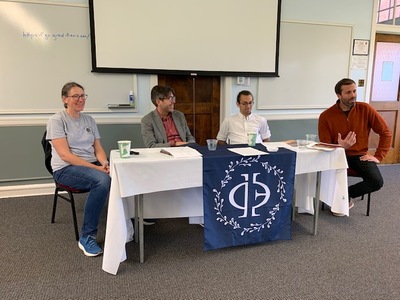 Naape
Naape
Four of our PhiLife members lead a session at the recent meeting of the North American Association for Philosophy and Education. On Sunday, Oct 27, we held a ninety minute session covering different initiatives at Notre Dame, Yale, George Washington University and Northeastern University. A description of the symposium included below.
Symposium on Philosophy as a Way of Life
The academic discipline of philosophy is often treated as an intellectual training ground where students learn to make arguments, marshal evidence, analyze syllogisms, and identify fallacies. As students grow in these skills, they develop the critical faculties that are useful in many facets of life—they become critical thinkers who can be counted on to perform a variety of intellectual tasks in a variety of contexts. But does the development of critical thinking skills constitute a genuinely philosophical education, or are there other skills, behaviors, and dispositions that students should be developing in philosophy courses? While they do not deny that critical thinking skills are an essential part of a philosophical education, the members of this symposium argue that philosophy courses can, and should, do more than produce intellectual skills. In the spirit of older traditions of philosophy, they argue that philosophy courses can help guide students in living differently and not just thinking differently: philosophy as a way of life.
Our first speaker, Jacob Stump, will consider the usefulness of out-of-class exercises in philosophical education. It is often said that instruction in philosophy is useful for improving one’s ability to reason well. Most of the time, however, only one part of this skill is taught: how to make valid inferences. When it comes to identifying which premises are true and which false, and especially when the premises are the sort that we might consider fundamental, i.e., not derived from higher premises, students are often left to trust whichever intuitions they began the course with—most often, then, the intuitions that they have been given by mainstream society. In this talk, presenter one will propose that, to make good on its promise of teaching students how to reason well, philosophical instruction can do better. He will present out-of-class exercises as the sort of pedagogical tactics that can help on this front, in particular by training perception and educating emotions.
Our second speaker, Matt Croasmun, will describe an approach to “way of life” education that focuses on a “vision of the good life” as the primary orienting locus of a way of life. On this account, visions of the good life are taken to include a tripartite account of the good life itself: an account of flourishing agency (what it means to lead one’s life well), flourishing circumstances (what it means for life to go well), and flourishing affect (what it means for life to feel as it should), alongside accounts of the reasons for living such a life, of our responsibility for living such a life, of the role of suffering in the good life (the obverse of affective and circumstantial flourishing), and of what one ought to do when one fails to live a good life (the obverse of agential flourishing). Way of life education is then conceived of as a matter of equipping students for the lifelong process of discerning the true shape of the good life. Pedagogically, this skill of normative discernment is cultivated through convening small seminars as communities of practice that together discern the nature of the good life through truth-seeking conversation.
Our third presenter, Mark Ralkowski, focuses on the theme of self-knowledge both inside and outside of the classroom. In the book The Road to Character, David Brooks distinguishes between “resumé virtues” and “eulogy virtues,” and he argues that we are very good at teaching young people how to cultivate resumé virtues, the traits they need to succeed in their careers, but we are negligent in the education of eulogy virtues, the traits we would like to be remembered for having. Our third presenter discusses how he puts his seminars together with this distinction in mind. He will also talk about the work he is doing as a “Posse” mentor at George Washington University. The Posse Foundation asks mentors to adapt their established curriculum in ways that utilize their experience and expertise. He uses the “way of life” approach to teaching philosophy to help his scholars become more self-reflective and self-determining first-year students. Posse is one of a few areas outside of the classroom where he sees promise for expanding the reach of “way of life” teaching. Others include outdoor education, study abroad, and service-learning “Alternative Breaks” trips.
Our fourth speaker, Meghan Sullivan, will do a short presentation on “philosophy as a way of life” courses as part of the Mellon Philosophy of a Way of Life Network. In particular she will focus on the impact they have had on student outcomes. Over 100 faculty and universities have joined the Mellon Network, with courses from all over the country. She will argue that this trend reflects the changing ambitions for introductory philosophy courses. Majors and minors in philosophy are up 60% since Notre Dame began their “God and the Good Life” courses. Presenter four will offer ideas into the reasons why these courses have been effective at recruiting students to the philosophy department. The program she will discuss has been ongoing for three years and the first cohort is now preparing to graduate. She will conclude with some observations about the way students have integrated these classes into their lives on campus.